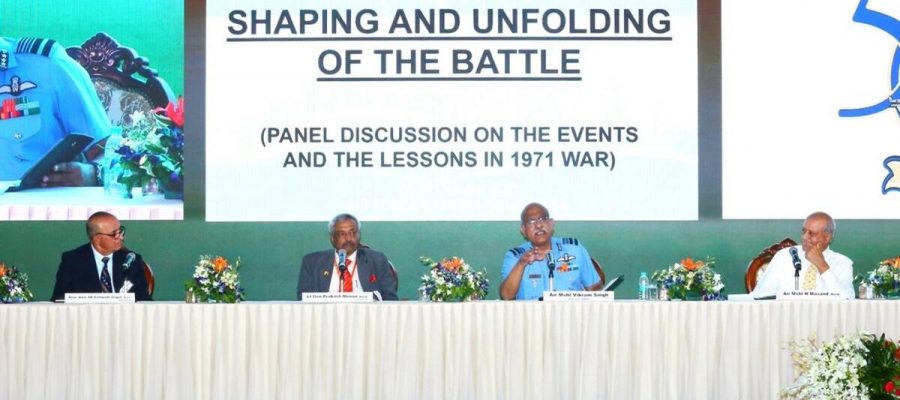Menon said the 1971 war was fought at a time when neither India nor Pakistan had nuclear weapons. Contrary to the popular rhetoric, he also said that if we manage to capture PoK, holding on to it would require the support of the local people.
On the second day of the Indian Air Force (IAF) conclave in Bengaluru, Lt Gen Prakash Menon, former military advisor, National Security Council Secretariat, opined it is imperative to learn lessons from the 1971 war in the context of current situation of India’s national security.
He said the application of military force against an adversary should be seen in the perspective of how it could affect them psychologically. “It is not about the firepower on the target, but what is important to be seen is how it affects the mind of the adversary. This lesson is important for us to remember because it is a lesson which is continuous in history and it will not change,” he said.
Menon said the 1971 war was fought at a time when neither India nor Pakistan had nuclear weapons. Contrary to the popular rhetoric, he also said that if we manage to capture Pakistan Occupied Kashmir (PoK), holding on to it would require the support of the local people.
“The capture of large parts of territory would also require the support of the people. Even if we manage to capture PoK, can we hold on to it if people are against us. The idea that India should capture large tracts of the territory in Pakistan so that it does not use terror against India is itself questionable. Since we were fighting for the independence of East Pakistan (later Bangladesh) we went there. We had the support of the people,” he added.
With reference to the 1971 war, Menon said the corps commanders should not be a ‘Yes man’ since their decisions on the ground will decide victory or loss in the battle. “We have to be cautious of the fact that today Western front cannot be viewed in isolation because another adversary in the Northern front will also make the moves at the same time or what we call Pakistan-China nexus. We must be prepared for intelligence failures. The ability to deceive you today is increasing with technology. Operational commanders must be prepared for this,” Menon added.
Air Marshal Vikram Singh, Air Officer Commanding in Chief (AOC-in-C), South Western Air Command (SWAC) , stated that since the performance of the IAF was less than expected in the 1965 war, in 1971 the IAF flew low to hit the targets. “This resulted in the maximum number of aircraft lost due to the ground fire. The Pakistan anti-aircraft artillery was the most modern of its time. Ninety percent of the losses were to these guns. Seventy guns were placed in Dhaka itself and all our losses there were to these guns,” he said.
Countering the popular opinion that India should have held onto the Prisoners of War (PoW), Singh said: “Pakistan returned all our PoW on December 1, 1972 and we returned their prisoners of war from December 1972 till the mid of 1974. There were only about 67,000 combatants and the rest were the wives and families and children. Moreover, the Pakistan Air Force pilots were a worthy opponent. They were very good in the air and therefore our victory over them was more credible.”
Source: Read Full Article



